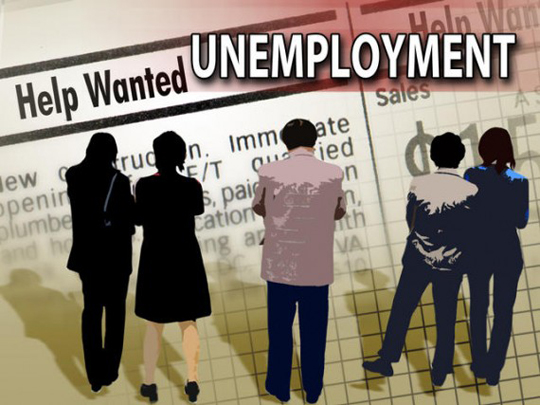New Delhi, Feb 22: Highest incidence of joblessness was witnessed among Christians in cities as well as in rural area followed by Muslims while Hindus and Sikhs reported least unemployment in urban and rural areas, says a recent government report.

"Among the specific religious groups, unemployment rate in both rural and urban areas was the highest for Christians (4.5 per cent in rural areas and 5.9 per cent in urban areas) and lowest for Sikhs in rural areas (1.3 per cent) and Hindus in urban areas (3.3 per cent)," said a report based on National Sample Survey 68th Round from July 2011 to June 2012. Muslims come second with an unemployment rate of 3.9% in rural and 2.6% in urban areas.
Many view the high unemployment rate among Christians as also a reflection of the higher education levels of community members who are in job market. Christians have the highest percentage of graduates.
According to the study titled 'Employment and Unemployment Situation Among Major Religious Group in India', among the specific religious groups, for males in rural areas, worker population ratio (WPR) was the highest for Sikhs (56.9 per cent) and in urban areas, it was the highest for Hindus (55 per cent).
For females in both rural and urban areas, WPR was the highest for Christians (28.4 per cent in rural areas and 25.2 per cent in urban areas).
In both rural and urban areas for both males and females, WPR was the lowest for Muslims (49.9 per cent for rural males, 15.3 per cent for rural females, 53.2 per cent for urban males and 10.5 per cent for urban females).
It said in terms of specific religious groups, among males in both rural and urban areas, Labour Force Participation Rate (LFPR) was the highest for Sikhs (57.6 per cent in rural areas and 56.8 per cent in urban areas).
For females in both rural and urban areas, LFPR was the highest for Christians (30.4 per cent in rural areas and 27.7 per cent in urban areas).
In both rural and urban areas for both males and females LFPR was the lowest for Muslims (51.1 per cent for rural males, 15.9 per cent for rural females, 55.3 per cent for urban males and 10.9 per cent for urban females).
Among persons of age 15 years and above, proportion of non-literates was the lowest for Christians (14.6 per cent for rural males, 23.7 per cent for rural females, 5.7 per cent for urban males and 9 per cent for urban females).
Proportion of persons of age 15 years and above with educational level secondary and above was the highest for Christians in rural areas for both males and females (36.3 per cent for rural males and 31.1 per cent for rural females) and for females in urban areas (62.7 per cent) whereas for males in urban areas it was the highest among Sikhs (67.6 per cent).
Among persons of age 0-29 years, for major religious groups, current attendance rate in educational institutions was the highest for Christians (58.5 per cent for rural males, 51.7 per cent for rural females, 61.5 per cent for urban males and 56.8 per cent for urban females).
Among persons of age 0-29 years, for major religious groups, current attendance rate in educational institutions was the lowest among Muslims (48.7 per cent for rural males, 42.1 per cent for rural females, 47 per cent for urban males and 46.3 per cent for urban females).
The survey was spread over 12,737 first stage units (7,469 villages and 5,268 urban blocks) covering 1,01,724 households (59,700 in rural areas and 42,024 in urban areas) and enumerating 4,56,999 persons (2,80,763 in rural areas and 1,76,236 in urban areas).





Comments
Dear KK Bhat,
Yes there are plenty of Muslims and Christians are jobless.
But they are not vandalizing and doing like Bhajis due of jobless.
You are just telling we love our country, if you are a true lover, study the constitution and respect it where it defends equality to all.
Christians and Muslims are not anti nationals. Patriotism is part of their religion.
You can not be a patriotic citizen until you uphold your constitutional duty and obligations.
Mr. Bhat,
Bajarangi are not only jobless but they are anti social criminals and rude. They shall be educated sense of humanity.
jobless have joined Hindutva forces since it's most profitable profession now. e.g. Lynch, Cow extortion, Security contract, Ghar wapsi, Riots, loots, vandalise, superstitous, Yoga, Dhyan etc etc.
Now anti-nationals should stop calling Bajrang Dal as jobless people. Reality is before you. Christians and Muslims are jobless.
Add new comment